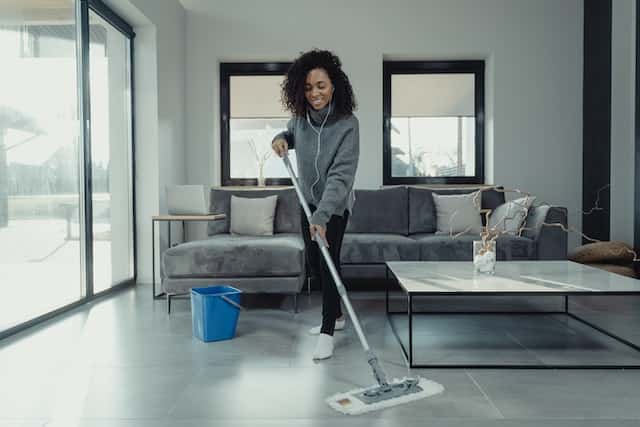Maintaining clean floors is essential for a healthy living space. However, the chemicals found in conventional floor cleaners can release toxic fumes, leading to indoor air pollution.
These toxic ingredients not only pose risks to our respiratory health but can also contaminate our waterways when washed down the drain.
In this article, we will explore the importance of non-toxic floor cleaners and provide valuable information on how to make informed choices for a healthier home environment.
Let’s begin.
Types of Toxic Ingredients in Conventional Floor Cleaners
Conventional floor cleaners often contain a cocktail of toxic chemicals, such as ammonia, bleach, phthalates, and volatile organic compounds (VOCs).
Ammonia and bleach, commonly found in many cleaning products, can cause respiratory irritation and trigger allergies.
Phthalates, often used as fragrance enhancers, are known endocrine disruptors linked to various health issues.
VOCs, found in many cleaning agents, contribute to indoor air pollution and can cause headaches, dizziness, and even long-term health effects.
Benefits of Using Non-Toxic Floor Cleaners
Opting for non-toxic floor cleaners provides numerous benefits. Firstly, they create a safer environment for you and your family by reducing exposure to harmful chemicals.
Non-toxic cleaners are formulated using natural ingredients that are gentle yet effective, making them suitable for all types of flooring.
Additionally, non-toxic floor cleaners are biodegradable, reducing their impact on the environment and water systems.
How to Choose Non-Toxic Floor Cleaners
When choosing non-toxic floor cleaners, it’s important to look for labels that indicate they are free from harmful chemicals.
Read the ingredient list carefully and avoid products that contain ammonia, bleach, phthalates, or VOCs.
Instead, opt for plant-based and biodegradable cleaners that harness the power of natural ingredients like citrus extracts, vinegar, and essential oils.
These alternatives not only clean effectively but also leave a fresh and pleasant scent.
Homemade Non-Toxic Floor Cleaner Recipes
Making your own non-toxic floor cleaners is a cost-effective and eco-friendly alternative. Here are four simple recipes you can try:
Recipe 1: Vinegar and Water Solution
- Mix equal parts of distilled white vinegar and water in a spray bottle.
- Spray the solution onto the floor and mop as usual.
Vinegar’s acidity helps dissolve dirt and grime while leaving floors clean and shiny.
Recipe 2: Citrus Floor Cleaner
- Squeeze the juice of one lemon or orange into a bucket.
- Add a few drops of mild dish soap and a couple of cups of warm water.
- Stir the mixture well to combine the ingredients.
- Use a mop or cloth soaked in the citrus solution to clean the floor.
The natural acids in citrus fruits help break down dirt and leave a refreshing scent.
Recipe 3: Baking Soda and Hydrogen Peroxide Solution
- In a spray bottle, combine 1 cup of water, 1/4 cup of hydrogen peroxide, and 2 tablespoons of baking soda.
- Shake the bottle well to dissolve the baking soda.
- Spray the solution onto the floor and let it sit for a few minutes to loosen dirt and stains.
- Scrub the floor using a soft-bristle brush or mop, then rinse with clean water.
The combination of baking soda and hydrogen peroxide creates a powerful cleaning solution that can effectively remove stubborn stains and grime from various types of floors.
Recipe 4: Tea Tree Oil and Vinegar Solution
- In a bucket, mix 1 cup of white vinegar, 10 drops of tea tree essential oil, and 2 cups of warm water.
- Stir the solution to blend the ingredients thoroughly.
- Dip a mop or cloth into the mixture and wring out any excess liquid.
- Mop the floor, focusing on areas that require extra cleaning attention.
The antibacterial properties of tea tree oil combined with the cleaning power of vinegar make this solution ideal for disinfecting and refreshing floors.
Remember to always test homemade solutions on a small, inconspicuous area of your floor before using them on the entire surface to ensure compatibility with your specific flooring material.
Eco-Friendly Floor Cleaning Practices
In addition to using non-toxic floor cleaners, incorporating eco-friendly cleaning practices can further enhance the health and sustainability of your home. Here are some tips to consider:
- Use microfiber mops or cloths: Microfiber is highly effective at capturing dust and dirt without the need for harsh chemicals. It also reduces the use of disposable cleaning pads.
- Limit water usage: Excess water can damage certain types of flooring. Use a damp mop or cloth instead of soaking the floor, and always follow the manufacturer’s recommendations for cleaning.
- Regular maintenance: Sweep or vacuum your floors regularly to prevent the buildup of dirt and debris. This will minimize the need for heavy-duty cleaning and extend the lifespan of your flooring.
- Open windows for ventilation: When cleaning, open windows or use fans to promote airflow and reduce the concentration of cleaning product fumes.
Conclusion
Switching to non-toxic floor cleaners is a simple yet impactful step toward creating a healthier home environment.
By eliminating toxic ingredients from your cleaning routine, you can protect your family’s health, reduce your ecological footprint, and contribute to a cleaner planet.
Embrace the power of natural ingredients and eco-friendly practices to achieve clean and safe floors without compromising on effectiveness.
Are you looking for natural cleaning ingredients for your car’s interior? Read 5 Natural Products to Use for Cleaning Your Car’s Interior.
FAQs
Q: Are non-toxic floor cleaners effective?
A: Yes, non-toxic floor cleaners can be highly effective at cleaning and maintaining various types of flooring without the use of harmful chemicals.
Q: Can non-toxic floor cleaners disinfect?
A: While non-toxic floor cleaners can remove dirt and grime, they may not have the same disinfecting properties as conventional cleaners. For disinfection, consider using alternative methods or products specifically designed for that purpose.
Q: Can I use non-toxic floor cleaners on all types of floors?
A: Most non-toxic floor cleaners are suitable for a wide range of flooring materials, including hardwood, laminate, tile, and linoleum. However, it’s always recommended to check the manufacturer’s instructions and test in a small inconspicuous area before using on the entire floor.
Q: Are non-toxic floor cleaners safe for pets and children?
A: Yes, non-toxic floor cleaners are generally safe for pets and children. However, it’s advisable to keep them away from freshly cleaned surfaces until they are completely dry to prevent slipping or accidental ingestion.
Q: How often should I use non-toxic floor cleaners?
A: The frequency of floor cleaning depends on factors such as foot traffic and the type of flooring. Generally, regular sweeping or vacuuming and occasional mopping with a non-toxic cleaner are sufficient to keep your floors clean and well-maintained.
References:
https://www.apartmenttherapy.com/how-to-disinfect-your-whole-home-with-tea-tree-oil-238685
https://www.limoneira.com/the-science-behind-diy-cleaning-with-citrus/
Photo by Tima Miroshnichenko from Pexels


